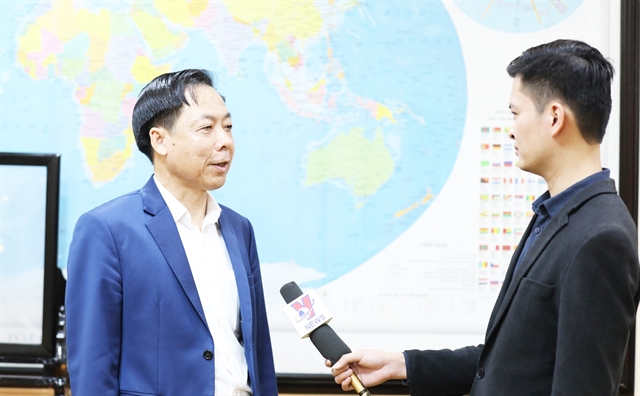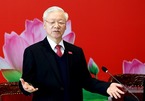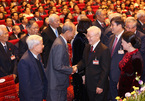 |
|
Deputy Inspector General Tran Ngoc Liem interviewed by VNA. — Photo Anh Tuan
|
Could you tell us some major breakthroughs in anti-corruption efforts in the Party’s 12th tenure?
The 12th-tenure has given due attention to the fight against corruption, and has obtained encouraging achievements – corruption has gradually got under control and can be considered to be on the decline.
The breakthroughs in anti-corruption are showcased through the aspects of leadership, discovery and handling of corruption, and official management efforts.
First, in terms of leadership, the Central Steering Committee for Anti-Corruption, headed by Party General Secretary Nguyễn Phú Trọng, has effectively exercised its role as the ‘commander’ of anti-corruption work – choosing to direct more resources on weaknesses and tough issues.
Second, co-ordination between different bodies of authorities involved in the fight against corruption has become much more fluid – especially between Party inspection agencies and Government auditing, inspection, and investigation agencies; and between procuracies at both central and local levels and ministries and sectors.
Since the beginning of the 12th tenure, Party committees at all levels have doled out disciplinary measures against 3,200 Party members – some even at the central level – found guilty of corruption. This is quite a major feat.
Since 2013, inspection and auditing authorities have handled 14,000 individuals and organisations, seized or attempted to recover VNĐ700 trillion (US$30 million) in assets along with 20,000ha of land in corruption-related cases; and transferred documents related to 700 cases with signs of criminal activities to the police.
The anti-corruption results in recent times have showed that we strictly abide with the leadership’s order and their view of ‘walking the walk, no forbidden zone, no exceptions to anyone.’
In addition, corrupt asset recovery rate has also witnessed significant improvements in recent times. In 2013, the recovery rate of corrupt assets in criminal cases reached merely 10 per cent, but moving to 2013-20, the average rate jumped to 32.04 per cent. This contributes to the elimination of the motivation for corruption and helps fix the consequences of corrupt acts.
Thirdly, another breakthrough is that personnel matters have been getting much more democratic, transparent, objective, and scrupulous. Many regulations put into practice in recent times have managed to considerably cut back on vested interests, or using bribes to get into high positions. If we want to really control, reduce, minimise or do away with corruption altogether, the human element in all this should be given priority. Personnel matters, if done well, would help curb corruption in the leadership and management level.
What about the role of improving the legal system and institutions in anti-corruption?
From the practical lessons we have seen, both domestically and internationally, to effectively prevent and control corruption, we need to do our best to set up stringent deterrence mechanisms so that officials cannot commit corruption, discovery and handling mechanisms so that officials dare not to commit corruption, along with a reasonable compensation and benefit mechanisms that can ensure there is no need nor want to commit corruption.
To have these mechanisms, we have to perfect our legal system and institutions.
The policies and orientations of the Party regarding anti-corruption must be institutionalised into legal regulations, meanwhile, legal regulations should be constantly reviewed, amended and improved to close loopholes that could be exploited for corruption.
That’s why legal and institution improvements are always an important focus in anti-corruption efforts, especially in ‘sensitive’ sectors where corruption could easily occur.
From 2013 up to now, the Party Central Committee, the Politburo, the Secretariat, along with the Party's advisory agencies have issued more than 200 documents on Party-building and anti-corruption; the National Assembly has issued more than 250 laws, ordinances and resolutions related to anti-corruption; the Government and the Prime Minister issued more than 2,600 decrees, decisions and directives; while ministries, agencies and localities have issued nearly 88,000 documents to detail and guide the implementation of anti-corruption efforts.
Most notably, after reviewing the 10 years of implementing the 2005 Law on Anti-corruption, we have developed the 2018 Law on Anti-corruption which contains many new measures, addresses limitations and creates an important legal basis to promote anti-corruption efforts in the future.
In addition, good international experience on anti-corruption – especially items contained in the UN Convention Against Corruption – has been codified in Việt Nam’s domestic laws related to anti-corruption.
So, I can say that that we have had a rather comprehensive legal set of tools to carry out anti-corruption work, what’s holding back the effectiveness lies in the implementation.
With that being said, the law is not static, it needs to move along with society’s developments so we cannot be complacent with the achievements we have obtained. We need to frequently review the work done to improve upon our legal institutions.
The supervision of this process is also of critical importance so that negative influences on law-building can be properly avoided.
What have been the inspectorate’s major results in uncovering and handling corruption?
In the past five years, the inspectorate has carried out 32,600 administrative inspections and more than 1 million specialised inspections – discovering economic violations worth some VNĐ417 trillion (about $18 million), involving 94,500ha of land; seeking accountability against 9,700 individuals and organisations; issuing 617,000 penalty decisions and VNĐ24 trillion in administrative fines; and transferred documents related to 462 criminal cases to police investigation units.
Under the close supervision and instructions from the Central Steering Committee for Anti-Corruption, the National Assembly, and the Government, the Government Inspectorate has made its mark in several high-profile cases – considered breakthroughs in anti-corruption efforts – such as State-owned telecom group Mobifone’s purchase of 95 per cent of shares of the private audio-visual company AVG, the equitisation of Quy Nhơn Port, second-phase expansion of Thái Nguyên Steel and Iron Factory, and the expansion and upgrades of Hà Bắc nitrogenous fertiliser plant and Thái Bình 2 thermopower plant, among others.
What are the Government Inspectorate’s major plans to realise the Party’s commitment to fighting corruption?
The fight against corruption is always a difficult one that requires both urgent, immediate, and long-term attention and resources.
The Government Inspectorate is committed to carrying out these major tasks and goals to assure the success of anti-corruption efforts.
First, the Inspectorate will closely follow the instructions from the Party Central Committee, the Central Steering Committee for Anti-Corruption, the National Assembly, the Government to build plans – short-term and long-term – to realise the Resolution of the 13th National Party Congress and the socio-economic development plan for the 2021-26 period, contributing to the fight against graft and waste.
Second, we will continue revising the 2010 Law on Inspection to mainline the spirit of the 2013 Constitution, the Party’s and Government’s regulations and policies on inspection activities; along with improving institutions – particularly in terms of power checks and balances and accountability – to ensure transparency and responsibility of leaders in uncovering and handling of corrupt activities and waste, while encouraging and protecting Party members and officials who are capable, innovative and determined.
Third, we will strive to consolidate and build a force of professional, responsible, disciplined inspectors with a strong sense of integrity, to take the lead in the fight against corruption, waste, and other harmful acts.
Fourth, we will continue to perform the State management function, effectively implement the 2018 Law on Anti-Corruption, the 2018 Law on Denunciation, especially new items regarding regulations on assets and income controls, prevention of conflicts of interests, anti-corruption work in the non-public sector, protecting and rewarding of whistle-blowers; develop anti-corruption evaluation criteria for the central-level ministries and agencies, which will serve as a basis for a comprehensive evaluation of anti-corruption work nationwide.
Fifth, the Government Inspectorate will focus on sensitive sectors and areas where complaints of harassment and bribery are rampant – especially where there are frequent contacts between officials or civil servants and the citizens or enterprises.
Sixth, we will strengthen coordination with internal affairs-related bodies of authorities to help their leaders with organising anti-corruption activities and get timely information and reports on corruption from them. The supervisory and critical role of the Việt Nam Fatherland Front and its member organisations, along with news agencies, the public and the society will be promoted to further improve the quality and effectiveness of inspection, resolving complaints and denunciations in anti-corruption.
We will continue to well implement the policy of 'Diversification and multilateralisation in foreign relations; proactive and active international integration; become a reliable friend and partner, and a responsible member of the international community'; participate effectively, responsibly and assert its role in international and regional cooperation forums on inspection, complaint settlement, denunciation and anti-corruption. — VNS

The man who holds aloft the flag at historic moments
It was when the battle against corruption needed a leader to raise the flag that Party Secretary General and State President Nguyen Phu Trong appeared, with intelligence and courage.

The Party General Secretary with wit, simple lifestyle
The top leader of the Party and State of Vietnam is indeed an outstanding politician in terms of qualifications, solid political courage, and high prestige, who has a very simple lifestyle.